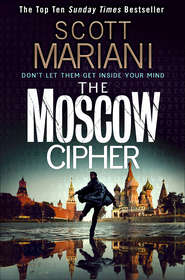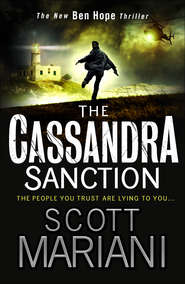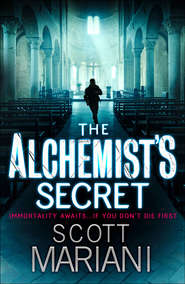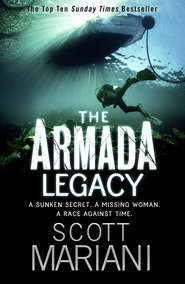По всем вопросам обращайтесь на: info@litportal.ru
(©) 2003-2024.
✖
Conspiracy Thriller 4 E-Book Bundle
Автор
Год написания книги
2019
Настройки чтения
Размер шрифта
Высота строк
Поля
It was from the man Michaela had talked about on their walk through the woods. Father Fabrice Lalique, the priest whose recent suicide had so upset Simeon. Ben opened the message. It was dated a couple of weeks earlier and read:
My Dear Friends
By the time you read this message, I will be dead. I ask you not to mourn for me, as I am unworthy of your grief.
The shame of my sins is a burden I can no longer bear. May God have mercy on me for the terrible things I have done.
Let his soul rot in hell for all I care, Ben thought. He clicked out of the emails and went online to run a Google search on the name Fabrice Lalique. It didn’t take long to dig up a whole collection of French news reports about the priest’s suicide and the discovery, shortly after his death, of large amounts of obscene material on the personal computer at his home in Saint-Christophe, near Millau in the Midi-Pyrénées area of southern France.
Revelations about paedophilia had a way of wiping out anything positive that might have been said of a man’s past life or career; not surprisingly, the news reports were full of disgust, even hatred. There were various quotes from members of his diocese, all of them expressing their shock at the appalling discovery and very little in the way of sympathy for the dead man. Some online commentators had dubbed Lalique the Paedo Priest. Ben came across forums and websites where the scandal had sparked a furious debate, with pressure groups demanding that governments step in immediately to end the secret culture of perversion and abuse within the Catholic Church or, better still, tear the whole rotten edifice down once and for all.
Most of the online articles had published the same image of Lalique, pictured at some official event wearing his priest’s garb. Ben immediately recognised him as the jolly-faced, full-bellied man who’d been standing on the right of the group shot in Simeon’s photo. Other images online showed the scene under the Millau viaduct where officials had scooped up what little remained intact of Lalique’s body after the enormous fall from the bridge. As suicides went, it had been highly efficient.
Ben shut down the PC, left the study and made his way through to the living room, trying to make sense of it all and knowing he was a long way from succeeding. As he looked around him for inspiration, one of the books in the antique bookcase suddenly caught his eye. He opened the glass door and slipped the old Bible off the shelf. It was a beautifully leather-bound edition, and one that he hadn’t seen since his first year at Oxford. Carefully turning the cover, he saw his own faded handwriting. ‘To my friend Simeon, from Benedict Hope.’
Ben was touched that Simeon had kept the birthday gift all these years, and saddened. He flicked through the pages of the book he’d once known virtually by heart. He still remembered great chunks of it, though a lot had faded from his memory. Maybe I should read it again, he thought. Simeon wouldn’t have minded if he borrowed it.
Ben set the Bible down on a table and was about to close the bookcase when he noticed the collection of videotapes and DVDs on the top shelf. Some were movies, some were documentaries, some were religion-themed programmes taped from TV, with handwritten labels stuck to their spines. The one that especially caught Ben’s eye was a home-recorded videotape labelled SIMEON VS THE ENEMY. He remembered Simeon’s words from the day before: ‘I have many enemies’. It had been hard to tell to what extent he’d been joking when he said it.
The Arundels’ TV rested discreetly on a stand in the corner, with a DVD player and VCR nestling below it. Ben took the tape down from the bookcase and inserted it into the machine.
Chapter Fourteen
According to the date scrawled on the videotape’s label with a marker pen, Simeon had recorded the TV programme a little over a year ago. It was one of those highbrow panel discussion shows that tended to be aired late at night, called The Monday Debate. The presenter was some tweedy type whose face looked vaguely familiar to Ben from one of the rare past occasions when he’d ever turned on a TV. Since moving to France he’d never bothered with it at all.
‘Tonight on The Monday Debate,’ the presenter announced, ‘we ask the question that is becoming more topical every year: Is religion harmful, and would we be better off without it?’
Poised behind twin lecture rostrums like two rivals in a political standoff were Simeon, on the right, wearing his white dog collar but otherwise casually attired, and a man on the left whom Ben had never seen before. He was somewhat older than Simeon, somewhere in his mid-to-late forties, with thick swept-back hair that could have been dyed to hide the grey. He was less casually turned out than his opponent, wearing an expensive-looking and immaculately pressed light grey suit, and gave the impression of a man who took himself extremely seriously. His eyes were darting and intense. The presenter introduced him as Penrose Lucas, Professor of Sociology and Anthropology at Durham and author of the recent Sunday Times number one bestseller God? What God?
Clear enough what side he was on, then, Ben thought. He’d never heard of this Lucas guy. From the brief resumé the presenter gave of the man, it seemed that the sudden runaway success of God? What God? had propelled him out of academic obscurity and into the realms of minor celebrity, as something of a figurehead for the growing pro-atheist lobby.
As the debate opened, Penrose Lucas went straight in like a greyhound leaving the gate. Pointedly refusing to refer to his opponent as the Reverend Arundel and insisting on Mr, he began a rapid-fire tirade about the centuries of slaughter and persecution and senseless warfare carried out in the name of religion.
It was hardly a new argument, but it was one that many Christians found difficult to refute, and Professor Lucas clearly intended to milk it to its full crushing advantage. He was eloquent and passionate, his case compelling. Religious belief was the most devastating of all the follies ever dreamed up by humanity. Without its destructive influence, mankind would be able to co-exist in a blissful state of utter peace. A new age would emerge in the wake of its long-awaited banishment to the dustbin of history, like young green shoots growing up in abundance on a fire-blighted landscape. An age of reason. An age of secularism. An age of scientific enlightenment.
Having rapidly reduced two millennia of Christian tradition to rubble and its followers to gullible imbeciles, Penrose generously ceded the floor to Simeon. Ben watched his friend on the screen as the cameras zoomed in, and felt his throat tighten with sadness.
‘The dogma of Christianity gets worn away before the advances of science,’ was Simeon’s opening line. The presenter seemed taken aback by his statement, and Penrose Lucas’ eyebrows shot up in delight, as if even he hadn’t expected to win the debate so quickly. ‘Yes! Exactly!’ he interrupted, nodding, eyes gleaming. ‘Then Mr Arundel concedes the point that—’
‘I wasn’t conceding anything,’ Simeon said calmly. ‘I was quoting from a well-known figure from history. One who knew something about war, I might add. I’m sure my learned friend, with his deep knowledge of history among his many other accomplishments, must be aware of who spoke these words that he so enthusiastically seems to embrace?’
Seemingly, Penrose Lucas wasn’t aware of anything, except that he’d possibly just walked into a horrible trap. He flushed scarlet under the studio lights.
‘That quote comes from Adolf Hitler,’ Simeon said. ‘An ardent atheist who, if Nazi Germany had won World War II, planned to eradicate Christianity within his empire just as he planned to eradicate the Jews. But I’m sure my learned friend wouldn’t try to argue that the war was fought over matters of faith?’
Lucas wisely chose not to expand on the point. Having got his opponent on the ropes, Simeon didn’t let go and began plucking more examples at random from history: Vietnam, a conflict fought over ideologies far removed from religion; the American Civil War, ostensibly fought over the issue of slavery, not faith. And on, and on, though Simeon was being careful not to lose his audience in a welter of information. Each new point seemed to hammer Penrose Lucas down a little further behind his rostrum and turn his face a little redder. Just a few minutes into the debate, and his studied composure was already coming apart at the seams.
‘In fact,’ Simeon challenged him with a winning grin, ‘can the Professor name a single major conflict of the last three centuries that was even remotely connected with Christian ideology?’
‘It doesn’t matter,’ Penrose yelled. ‘Anyone who believes in the very notion of a god is suffering from a serious mental delusion. These people need treatment.’
‘Speaking as a qualified psychiatrist as well?’ Simeon asked, still smiling. ‘With all due respect, I hope your knowledge in that field is better than your understanding of history.’
The debate turned away from the issue of warfare and raged on, though all the raging was done on Penrose Lucas’ side and Simeon preserved his cool impeccably. Ben watched another few minutes, smiling to himself at the way Simeon was able to run rings around his opponent.
By the time he stopped the video playback, the rolling script at the bottom of the screen was already giving the results of the TV phone-in. The vote was running 76% in favour of Simeon.
‘If Professor Lucas’ book is as well-argued as his effort in this debate,’ said one of the scrolling quotes emailed and texted in from viewers, ‘I won’t be buying it’. Others said much the same thing.
It was highly entertaining stuff, but Ben wasn’t in the mood for entertainment. He turned off the TV. Suddenly the room was quiet and still and dark. Simeon was gone again, for the second time that night.
Chapter Fifteen
Professor Penrose Lucas stepped out onto the balcony of the clifftop villa and gazed out from the rocky coast of Capri across the still, dark waters of the Gulf of Naples. His migraine was throbbing, and he was still quaking from the nightmare that had racked him for what seemed like hours before he’d eventually managed to tear himself away from it, sitting bolt upright in bed with a gasp, drenched in sweat.
Even now, his father’s roar continued to reverberate in his ears.
‘Hell rip and roast you for a bastard, boy!’ Whack.
Penrose shuddered. He could still smell the dreaded leather belt that the old man had kept coiled ready for use in a jar of vinegar, the filthy sick sadist. Penrose wouldn’t ever forget the sting of that belt on his skin. The lashing crack of the leather. The sound of his own screaming, still sharp in his memory after thirty years.
‘Remember me, boy. Those who are tainted shall drink the wine of the wrath of God, and they shall be tormented in the presence of the holy angels!’ Whack. Whack.
Penrose watched the white crests of the waves in the darkness until his father’s voice receded to nothing and his migraine began to ease.
How he had detested that man, with a burning force of hatred whose violence had never abated, from his earliest youth to the time he’d left home, to the day of the old man’s death eleven years ago. Standing there at the graveside surrounded by those forlorn, snivelling mourners who’d lacked the wits to see through the tyrant’s veneer of charm, Penrose hadn’t been able to restrain himself from cackling out loud as he’d watched the coffin descend into the ground. His only regret had been that the Reverend Gerald Collingsworth Lucas, Deacon for the Diocese of Winchester, had now been released from the agony of the cancer that had been eating him away, one wretched cell at a time, for over a decade.
By the time of his father’s long-awaited, infinitely relished passing, Penrose’s academic career had been well on track. A sparkling talent, he’d been set from early on to become one of the youngest university professors of his generation. He’d never married, never formed any serious relationships with women and had few friends, devoted instead to his work and to the first glimmers of what had eventually evolved into his first book. When he hadn’t been buried in the rapidly expanding manuscript of God? What God? he’d been nailed to his desk writing hosts of long, impassioned online articles about the evils and corruption of organised religion, most especially those of Christianity.
After the completed book manuscript, all one hundred and eighty thousand incendiary words of it, had unexpectedly sparked off a bidding war between major British publishers and Penrose had found himself suddenly in possession of a six-figure advance that he didn’t really need, he’d immediately begun putting the money to good use. Thus had begun the second stage of his war against the church and his father’s memory.
Penrose secretly paid seventeen thousand pounds to a firm called Hardstaff & Baldwin Ltd, a shabby little private investigation outfit in Darlington, to dig up as much dirt as they could on members of the clergy, of any Christian denomination, across the north-east of England. Within three months, H&B’s diligent sleuthing had managed to produce video footage of a well-respected pastor in Leeds, one Reverend Tobias Bateman, sneaking away from his wife at night for regular visits to the notorious Water Lane red light district in Holbeck, where he was reported to enjoy being tied up and beaten by a lady wearing only a shiny leather mask.
Penrose swiftly closed in for the kill. The ensuing media furore led to the defrocking, disgracing and divorce of the good Reverend Bateman. The source of the information remained a secret, naturally. Penrose’s money had been well spent, and he had a lot more to burn now that his book was selling like hot cakes. Having tasted blood, he now enlarged his operation to include the whole of England, an initiative that cost him the remainder of his publishing advance and then some more. To his horror, his investigators turned up nothing for months. No church sex romps, no internet poker-addicted bishops or lesbian nuns, not a shred of scandal or intemperance to be found anywhere. Penrose began to realise he was going to have to become more creative.
It wasn’t long afterwards that he hit paydirt, in the form of a highly esteemed and well-known psychotherapist called Dr Nora Gibbs, shrink and hypnotist to sports personalities and television celebs. Purely by chance, one of Penrose’s growing network of investigators stumbled across an old legal case and happened to report it back to his employer. It appeared that two decades earlier, when Nora Gibbs had been Nora Jamieson and a student at Sussex University, she’d been arrested in possession of amphetamines, cocaine and a quantity of magic mushrooms, which she’d been distributing to her fellow students – one of whom ended up hospitalised as a result. It had been a minor scandal at the time, but nobody had ever before dug up the connection with the famous Dr Gibbs.
Two days after Penrose’s tip-off, the celebrity shrink received an anonymous letter giving her very specific and clear instructions on how to avoid revelations about her past being leaked to the national media. Some time later, a very well-known male TV presenter, who’d been receiving hypnotherapy treatment from Dr Gibbs for stress and depression, suddenly recovered deeply repressed and hitherto undreamed-of memories of serious sexual abuse at the hands of the nuns and priests at the Catholic boarding school he’d attended in his youth. The TV presenter, shaken and angry but eternally grateful to his shrink for having made him aware of his forgotten past, went public with his allegations. Despite the lack of a single shred of evidence, the ensuing storm was enough to bring about the closure of the school. A retired priest called Father O’Rourke narrowly avoided being lynched by a mob that gathered outside his home, and died soon afterwards of heart failure.
It was Penrose 2, God 0. He would lie awake at night, savouring the ingenious brilliance of his coup and fantasising about what he could achieve if he had more money to spend. With a big enough budget, he could bring the whole rotten thing down. Squash all of the cockroaches flat. By now he was hard at work researching his second book, Murdering for God, a scabrous condemnation of every war atrocity and act of violence ever perpetrated in the name of Christianity. Meanwhile, he’d launched his brand-new website along with its own popular discussion forum that attracted enlightened thinkers and militant atheists from all over the world.
He was rolling.
It had been one rainy early October day, heading back to his car after a hard afternoon’s lecturing of a group of second-year anthropology students, that the Hand of Fate had reached out to Penrose Lucas in a very unexpected manner. And his life had changed.
The stranger was loitering near a sleek black Mercedes that Penrose had never seen in the University staff car park before. The Mercedes looked brand new. The number plate was private. The man was about forty, greying above the ears, lean and sharp-featured. He was wearing a dark suit and a camel coat that was worth Penrose’s monthly salary. His shoes gleamed on the wet tarmac. As Penrose approached his car, the man stepped away from the Mercedes and walked up to him. ‘Professor?’
Penrose stopped. The man was smiling and looking him right in the eye.











